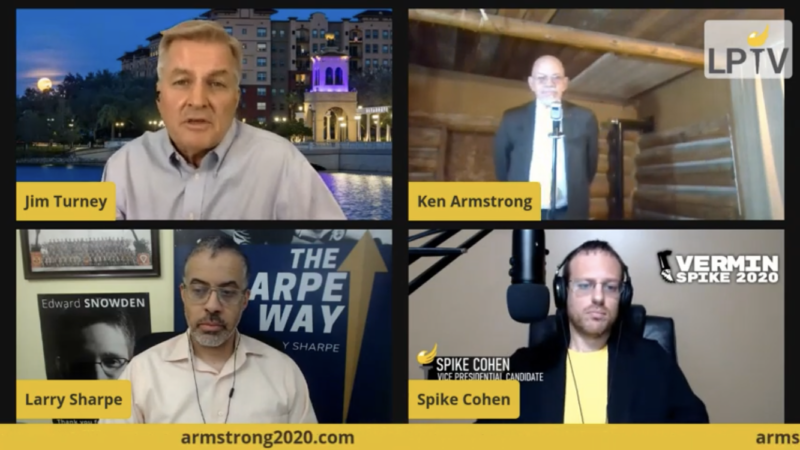We Watched the Libertarian Party Vice Presidential Debate So You Didn't Have To
Larry Sharpe, Spike Cohen, and Ken Armstrong strategize about how to sell liberty during a pandemic.

Three leading contenders for the Libertarian Party (L.P.) vice presidential nomination debated remotely Thursday night, moderated by old party hand Jim Turney.
Larry Sharpe was a close runner-up for the V.P. nod in 2016, getting nearly 47 percent on the second ballot against winner William Weld, the former Republican governor of Massachusetts. Though the party's delegates choose president and vice president via separate votes, Sharpe has been linking himself with Judge James Gray, one of the presidential candidates. Sharpe stressed their ticket's focus on helping party growth and down-ticket candidates in his opening statements.
Spike Cohen, who emphasized his decades of business experience and currently runs Muddied Waters Media, has linked himself to presidential hopeful Vermin Supreme. He did not, however, stress this during the debate, though, the way Sharpe did with Gray.
Ken Armstong is a former NATO base commander in Italy as well as a former Alaskan pipeline worker.
The candidates were mostly asked how they would message and campaign. Cohen noted his media ability to reach millions of Americans in an entertaining, engaging matter that focuses on libertarian fundamentals of self-ownership and non-aggression. He says he's been successful going door-to-door and talking to people all over, from college campuses to housing projects, showing them how the system of government control is designed to fail the people while helping those in power and their connected pals. He says Americans acutely understand, due to this pandemic, that something is seriously wrong with the status quo and that his "empathetic, sympathetic" approach that tries to drill in on people's problems and offer libertarian solutions will work best. Cohen sums up his message as: "You own yourself, your life, your body and your labor and your property, and we stand alongside you against anyone who tries to take it from you."
Armstrong said he's been on the road campaigning for a year already, and proudly noted his endorsement by the Libertarian Pragmatist Caucus. He thinks the bad example of government tyranny and failure in the pandemic means "you don't need to do much convincing" this year to show people government is not the solution.
Sharpe suggested his experience as an executive coach and Libertarian candidate for governor of New York in 2018 gives him the ability to sell libertarianism as something "radical enough to make people go, 'Hmm,' but at the same time familiar enough to go, 'Oh yeah, that's not so crazy, I can say "Yes."'" He was proud of discussing marijuana legalization in terms of, "regulate cannabis like onions," to make legalization feel both radical but familiar and doable. He mentioned his first attraction to libertarian ideas was through business writer Robert Ringer, but his attachment to the party came through Gary Johnson's 2012 campaign.
Cohen said his experience running a business and seeing how regulations and taxes make it harder every step of the way for business owners, employees, and customers turned him from his neoconservative past. He then fell deep into libertarian scripture due to works like Frederic Bastiat's The Law and Lysander Spooner's No Treason.
Armstrong cheekily credits the Democratic Party in Hawaii, which he used to work with, for turning on him over his objection to a tax increase and pushing him toward the L.P. He thinks his life experience as someone who had worked with both minimum wage workers and people at the highest level of government will give him wide appeal.
Sharpe, who is African-American, stresses that his preferred presidential choice—former California Superior Court Judge James Gray—is someone who people will "listen to [even though he's] being different because he looks similar," then proudly noted how well he'd navigated the thorny question of minority representation in the ticket. "See how I spun this? I'm good at this. This is why I should" get the vice presidential nod. Sharpe also says he learned from his gubernatorial run that money is even more vital than he knew if the ticket expects to be polled or get national media attention.
They were all pro-immigration, with Armstrong discussing, as a short-term goal, a free-trade zone funded by businesses along the U.S.-Mexican border. While all agreed on retreating from overseas commitments, Armstrong stressed that we needed to do so gradually because of the bad effects a swift pullout might have, like in Okinawa, Japan, where our presence has been relied on for so long. Cohen was more emotionally charged in his attack on the system of intervention that has cost so many lives and so much treasure.
Sharpe emphasized that a Gray/Sharpe ticket would do the most for down-ticket L.P. candidate support. He said he believes the only realistic chance Gray has of winning the presidency is if the election goes to the House of Representatives because no one candidate gets an electoral college majority, which would sadly mean that he, Sharpe, would have no chance of actually becoming vice president. That's because the Senate, who would make that pick if that happens, is required by law to choose from among the top two actual vote-getters. (The House can pick from the top three for president.) Armstrong strongly insisted the L.P. ticket must run as if it could (and would) straight-up win the election.
The Libertarian Party will have delegates chosen by its state parties selecting its presidential ticket in an online convention this weekend. The president is chosen first, starting Saturday, with the vice presidential vote scheduled for Sunday.
